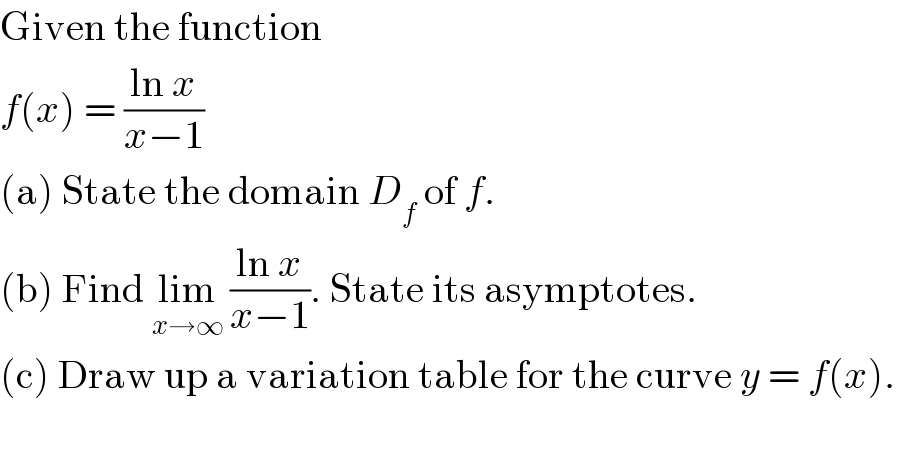
Question and Answers Forum
Question Number 98539 by Rio Michael last updated on 14/Jun/20

Answered by Aziztisffola last updated on 14/Jun/20
![a)D_f =]0;1[∪]1;+∞[ b) lim_(x→∞) f(x)=0](Q98541.png)
Commented by Rio Michael last updated on 14/Jun/20

Commented by Aziztisffola last updated on 14/Jun/20

Answered by mathmax by abdo last updated on 14/Jun/20
![1) f is defined on ]0,1[∪]1,+∞[ 2) lim_(x→+∞) ((lnx)/(x−1)) =lim_(x→+∞) ((lnx)/x)×(1/(1−(1/x))) =lim_(x→+∞) ((lnx)/x)=0 so y=0 is assymptote alway x=1 is assymtote . 3) f^′ (x) =(((1/x)(x−1)−lnx)/((x−1)^2 )) =(((x−1)−xlnx)/(x(x−1)^2 )) =((ϕ(x))/(x(x−1)^2 )) ϕ(x) =x−1−xlnx ⇒ϕ^′ (x) =1−(lnx+1) =−lnx ϕ^′ >0 ⇔−lnx>0 ⇔ lnx<0 ⇔ 0<x<1 x 0 1 +∞ ϕ^′ ∣∣ + − ϕ ∣∣ −∞decr 0 decr −∞ ⇒ ϕ(x)≤0 ⇒ f^′ <0 ⇒f is strictly ideccreazing vareiation of f x 0 1 +∞ lim_(x→1) f(x) =1 f^′ (x) ∣∣ − ∣∣ − f(x) ∣∣+∞ dec 1 decr 0](Q98554.png)
Commented by Rio Michael last updated on 14/Jun/20

Commented by abdomathmax last updated on 15/Jun/20

